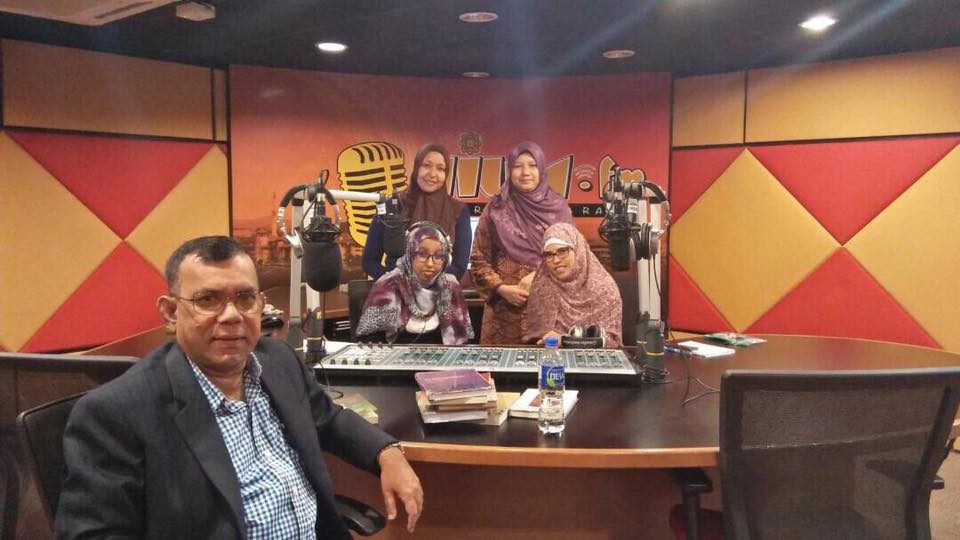By Gabriela Aurora Mondragon Meza
GOMBAK, 10 October 2017: “Conducting research is all about passion and to become a successful researcher, one must have the compulsive desire to pursue research as research is about obtaining knowledge to share with society.”
Acting Dean of Kulliyyah of Islamic Revealed Knowledge and Human Sciences (KIRKHS), Prof. Dr. Mohammad A. Quayum, told listeners this in a programme called “Insights into Research and Publications” broadcast over IIUM.fm last Friday (6 October).
“Insights into Research and Publications” is a newly introduced programme brought by the Research Committee of KIRKHS, aimed at promoting research and publications by the academic community and IIUM students, and to inspire the audience to conduct research and publications, and to learn from contributions of others. Prof. Quayum became the first person to be interviewed by the campus radio station on the programme.
During the interview session, Prof. Quayum shared with the audience his personal interests in literature from America, Southeast Asia and South Asia — the three areas of literature he has studied and explored in his long career spanning nearly 40 years.
He told listeners that it was important for him to look at his own identity as a Bengali and Bangladeshi. Because his daughter, who was born and brought up in Australia, does not speak Bengali, and he felt compelled to go deep into doing research on Bengali literature, especially translating several of the leading Bengali writers into English so that he could share them with his daughter.
For him, conducting research in literature is important because” literature is about society, culture and human behaviour”.
“Literature can reflect the lifestyle and culture of the people where it is set. Â Conducting research in literature contributes significantly to humanity because it helps to bring societies closer and create better understanding among people of different cultures; it can act as a bridge between peoples and cultures.”
That is why, to be able to conduct research in literature, he said, “One needs to be not only aware of and sensitive to other cultures but to other disciplines as well, such as linguistics, history, politics, philosophy and psychology, because literature is the melting pot of all these disciplines, and we need them to explore the consciousness of a writer and to unlock a literary text.”
During the interview, Prof. Quayum encouraged the youth to get into the habit of reading. He said that it is an important habit to develop from childhood, but is also possible to develop in adolescence or later in life.
“Reading allows the reader to cultivate his or her imagination, to know other people, places, cultures and societies, and to appreciate other points of view about the world. It also allows the individual to acquire patience, because books are nothing but black letters strewn on a white page and it requires a great deal of patience to keep ones focus on that in the midst of so many distractions in life.”
The most interesting part of reading, according to Prof. Quayum, is “imagining the characters and the scenes created by literary texts”.
During his discussion about his life as a student and researcher, he spoke of his experience in doing research before and after the advent of Internet. He said, at the time he was writing his doctoral thesis on American literature in Australia in the 1980s, he used to send letters to one of the writers he was writing about, Nobel Laureate Saul Bellow, and established good contacts with him through the letters because there was still no Internet or emails available for communication.
He added that eventually, this writer became very enthusiastic of his doctoral project because he was the first person to write about these American writers — Emerson, Whitman, Thoreau and Saul Bellow — in Australia.
Prof. Quayum recognised that technology has made a big change in the way of doing research. He claimed that nowadays it is cheaper, faster, and easier to travel from one place to another in one day, and this is how the world has become a smaller place, and almost a global village, in the present era.
The Professor also discussed his works on Begum Rokeya, a writer from India who lived between 1880 and 1932. Other than becoming a writer, she was also an educationist, social activist and advocate of women’s rights. She wrote poems, short stories, science fiction, satires, treatises and essays, and Prof. Quayum was the first person to undertake a significant translation of her work into English. His translation was published as The Essential Rokeya, by the Brill Publishing of Netherlands in 2013.
Prof. Quayum has published 32 books with leading publishers around the world. He is also the author of numerous articles in leading literary journals in Australia, Canada, India, New Zealand, South Africa, Singapore, Taiwan, the UK and the USA, and has also published many book chapters, book reviews and encyclopaedia entries.
Some of the books he has published are: Imagined Communities Revisited: Critical Essays on Asia-Pacific Literatures and Cultures (2011), The Poet and His World: Critical Essays on Rabindranath Tagore (2011), Rabindranath Tagore: Selected Short Stories (2011), and The Essential Rokeya (2013), which is about an Indian pioneering Muslim writer.
Hailed from Bangladesh, Prof. Quayum is a Professor of English and American Literature at IIUM, and an Adjunct Professor of English and Creative Writing at Flinders University, Australia.
He has been a lecturer at this University for the last 14 years having previously taught at Nanyang Technological University, Singapore, the State University of New York at Binghamton, USA, and Universiti Putra Malaysia.
Ending the programme interview, Prof. Quayum reminded listeners that many of his books are available at the IIUM Library and may also be purchased from Amazon.com and in several bookstores in Malaysia, such as Kinokuniya, Silverfish Books and MPH.
The new radio programme live on “Insights into Research and Publications in IIUM” is accessible by typing the following URL: http://www.ustream.tv/channel/iiumfm2. or follow on Facebook: IIUM.fm “ Your Campus Radio. ***
